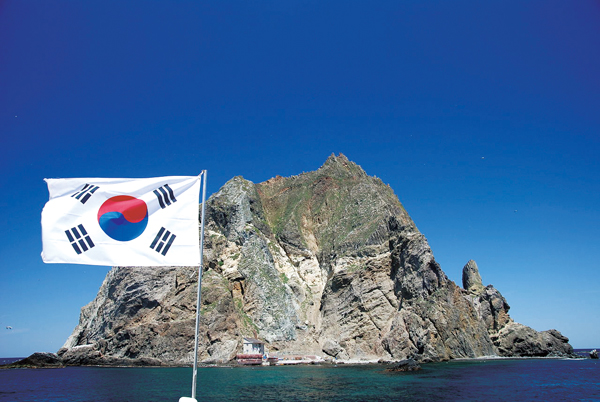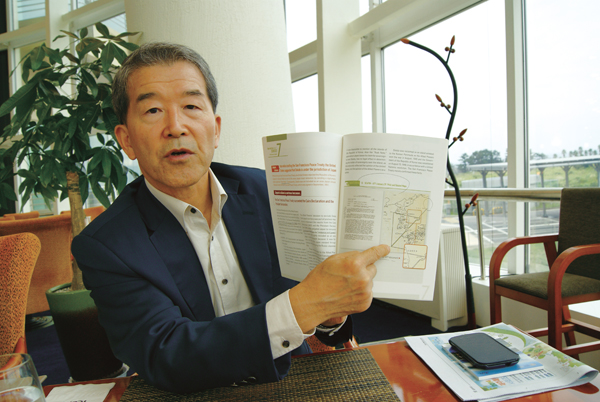| |
 |
|
| ▲ A ship displays the Korean flag as it approaches Dokdo, the Korean islets in the East Sea. Photo courtesy Ulleungdont |
“Nowhere is the return of geopolitics more present than in Asia,” states academic Walter Russell Mead.
The Cold War seemed to have dimini-shed its importance as states, and their geographic dimensions and interests, were subsumed under the antagonistic ideologies of Capitalism and Communism.
Despite Francis Fukuyama's promise of the “End of History,” Communism’s collapse seems to have reinvigorated the uncertainties of history, with inter- and intra-state conflict resurgent, all too evident presently.
While the globe’s focus in the Asia-Pacific has been on China’s spats in the South China and East China Seas, Korean eyes have always been on Dokdo, the Korean islets in the East Sea over which Japan claims sovereignty. Central to national identity, etymologists suggest the name comes from the root "dok," with connotations of loneliness. The islands are, however, eagerly coveted.
The Liancourt Rocks, as they are known in English (or Takeshima in Japanese), consist of two main islets and 35 smaller rocks 215 k.m. east of mainland Korea. The 0.18745 square kilometers house little more than a lighthouse, a helicopter pad, a police barracks and a post box.
A constant in concerns over Korean sovereignty, they are much more than the sum of their parts. Thus, with Dokdo Day approaching on Oct. 25, I approached Chung Dal-ho for interview, current chief of Jeju International Training Center (JITC) and former ambassador to Egypt and Panama.
As a diplomat, Chung had to "per-ennially think of both real and apparent threats" to the state, and meeting with The Weekly he displays the patriotic pride, albeit diplomatically measured, the islets routinely induce in Koreans. My questions, perhaps disinterested in its original sense, seek to tease out some fundamentals about the maritime territory.
My very wording, offers Chung, highlights our discursive distance; Dokdo is not a territorial, but an historical issue. As the first piece of Korean land occupied by the Japanese in 1904, one year before Korea proper was annexed, the islets are existentially Korean soil.
"So my point is, they [the Japanese] view Dokdo as a territorial problem linked to the colonial mind, but [we take] a reverse colonial attitude," he said, sensing a lingering shadow cast across the East Sea. "[T]hey [the Japanese rightwing] still have an expansion strategy; they need to secure outposts, effective outposts," he said.
| |
 |
|
| ▲ Chung Dal-ho and "10 Truths About Dokdo" Photo courtesy Darren Southcott |
While conflict seems remote, Chung, reflecting on his time as a diplomat, emphasizes that the international community is “largely indifferent to hardcore bilateral issues,” and views the islets through a different lens, only being “galvanized” by direct threats to security. He points to a resurgent nationalism in Japan, and Shinzo Abe’s much-reported lurch to the right.
When Chung began his service under Park Chung-hee in 1976, Dokdo was not to be broached following a 1960s bilateral agreement, leaving the islets pragmatically off the agenda well into the 1980s. From 1987 onwards, with Korean democratization, such issues began to be discussed, however.
As the people exercised their new-found confidence, issues once simmering came to the boil. In one of the first public calls on the issue, Chung wrote an early-90s op-ed for the Donga Daily, calling for the Korean government to take more effective control of the islets. He urged Seoul to treat the disputed territory like any other part of Korea, and remove, for example, the need for applications to visit.
"I perhaps wanted to appeal to the Korean public in making Dokdo effectively under Korean jurisdiction," he says, adding that the foreign ministry would, even then, tend to reject applications for fear of provoking the Japanese.
"[A]t a certain point, perhaps as Korea came to realise it had this voice, an unsuppressed voice, riding the tide of nationalism, perhaps ... I didn’t want to have the issue under the surface ... I wanted to make it clear that Dokdo was part and parcel of Korea, period."
The former diplomat knows that with global realignment and a shift to Asia, unresolved issues can "pop up" at any time. Chung thus stresses that Dokdo cannot be ignored. Conceding that the two nations are effectively involved in a “public relations war,” he passes me a copy of “10 Truths About Dokdo,” published by the East Asia History Foundation, outlining Korea’s strong case for sovereignty.
Rather than engaging in bilateral verbal spats, however, for lasting peace Chung would like to see the United States — “the major culprit” — take a more forthright role. It is the omission of Dokdo from the 1952 San Francisco Treaty — despite being included in an early draft — which fuels the current dispute. Another Cold War remnant, the US allegedly wanted to ensure the strategic islets didn’t fall into Communist hands in the event of a North Korean victory in the Korean War. Japan’s legalistic argument hinges on this omission.
Despite the rhetoric of conflict, Chung talks more of preparedness, and places more value on bilateral cooperation in the current climate. Rather than pushing Dokdo to the top of the agenda, it is through education that the Korean case can be made most strongly, he says.
Alongside more active US involvement, Chung believes student exchanges are essential in fostering a spirit of friendship between the nations’ youth. He notes the response to a speech he made in Tokyo this summer in which he tasked regional youth to work for East Asian recon-ciliation. “It was off the subject, but it struck a chord,” he says, and he adds that Jeju’s own JITC could well be the platform for such a student exchange.
“Not just for the current generation, I hope to see Jeju become a venue for reconciliation for future generations, too,” says Chung.
Jeju, long a site of geopolitical conflict itself, thus continues to be a beacon of hope despite sitting in troubled waters. |





















